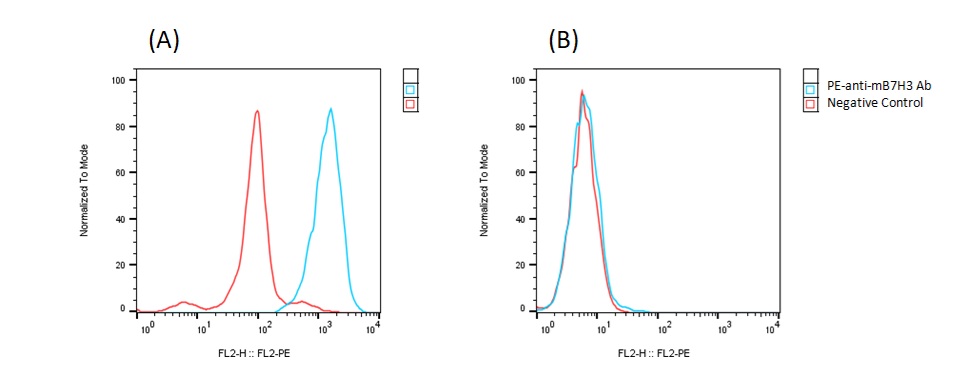
| Catalog Number | Product | Size | Price | |
|---|---|---|---|---|
| C3101 | Rat B7-H3-CHO-K1 Stable Cell Line | 2 vials | $3950 | Order |
| Catalog Number | C3101 |
|---|---|
| Cell Line Name | Rat B7-H3-CHO-K1 stable cell line |
| Accession Number | NM_182824.2 |
| Host Cell | CHO-K1 |
| Quantity | Two vials of frozen cells (2x106 per vial) |
| Culture Medium | DMEM with 10% FBS, 4 µg/ml puromycin |
| Freezing Medium | 90% FBS and 10% DMSO |
| Storage | Liquid nitrogen |
| Product Datasheet: | Download PDF |
Detection of Rat B7-H3 expression on Rat B7-H3-CHO-K1 stable cells (A) and Vector control-CHO-K1 stable cells (B) using PE-anti-mouse B7-H3 Ab (BioLegend, #124507).

B7-H3, also known as CD276, is a cell surface protein that belongs to the B7 family of immune regulatory molecules. B7-H3 has two isoforms determined by its extracellular domain. In mice, the extracellular domain consists of a single pair of immunoglobulin variable (IgV)-like and immunoglobulin constant (IgC)-like domains, whereas in humans it consists of one pair (2Ig-B7-H3) or two identical pairs (4Ig-B7-H3) due to exon duplication. B7-H3 mRNA is expressed in most normal tissues.Flow cytometric analysis demonstrated inducible expression of B7H3 on monocytes, dendritic cells, and T cells after stimulation with selected cytokines and mitogens. B7-H3 protein is expressed at high frequency on many different cancer types (60% of all cancers).B7-H3 has both costimulatory and coinhibitory properties that can affect the proliferation of CD4+ and CD8+ T cells, production of cytokines, and activity of T cells and NK cells depending on the microenvironment. B7-H3 also exhibits nonimmunological pro-tumorigenic functions such as migration and invasion, apoptosis, cell viability and chemoresistance.
Chapoval AI, Ni J, Lau JS, et al. Nat Immunol. 2:269-274. 2001.
Zhou WT, Jin WL. Front Immunol. 12:701006. 2021. Picarda E, Ohaegbulam KC, Zang X. Clin Cancer Res. 22:3425-3431. 2016.